We can find a mosque at the heart of every community. They are as old as Islam itself and are the beating heart of a community. Moreover, they stand as a physical symbol of our faith. It is literally a place of worship for Muslims. In Urdu, we call it a masjid. We call informal and open-air places of worship as musalla.
Rules of presence in the mosque
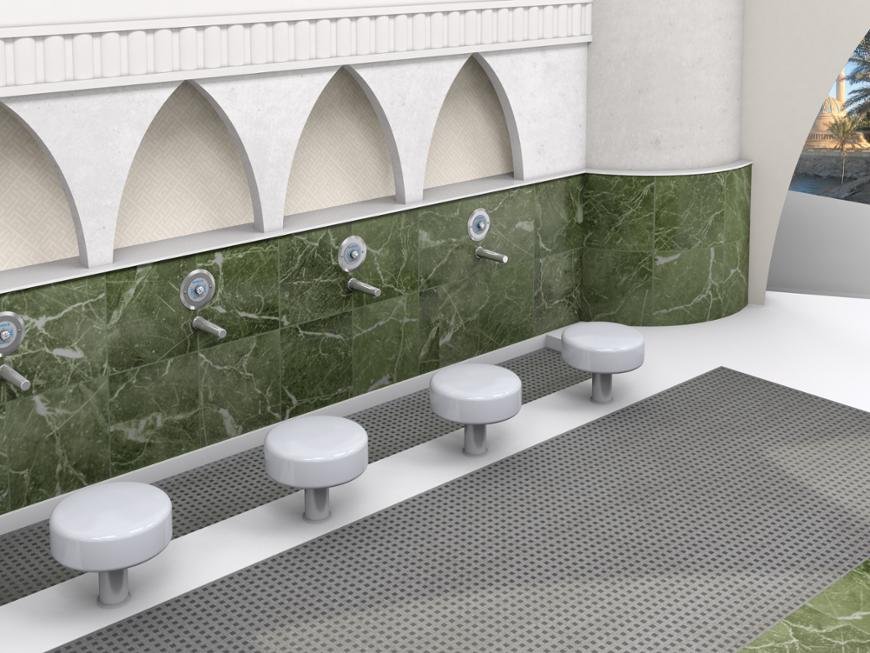


There are many rules that believers must obey when they are in a mosque. In most mosques, a religious leader called Imam is in charge of prayers. Muslims must clean themselves before they enter into a mosque. Hence there are washing areas where they can make wudu before entering the prayer hall. Muslims offer Salah on the prayer mat so they must not step on it with shoes. They should not speak loudly in the mosque. There are libraries in mosques which offer a variety of books on Islam which will expand knowledge on Islamic teachings. Education is very important in Islam and is very important to mosques as well.
Also, Muslims must keep them clean, perfumed and purified. As Aisha bint Abi Bakr (ra) narrated:
“The Messenger of Allah (pbuh) commanded that mosques to be built in (Ad-Dur) villages, and that they be purified and perfumed.”
Structure of mosques
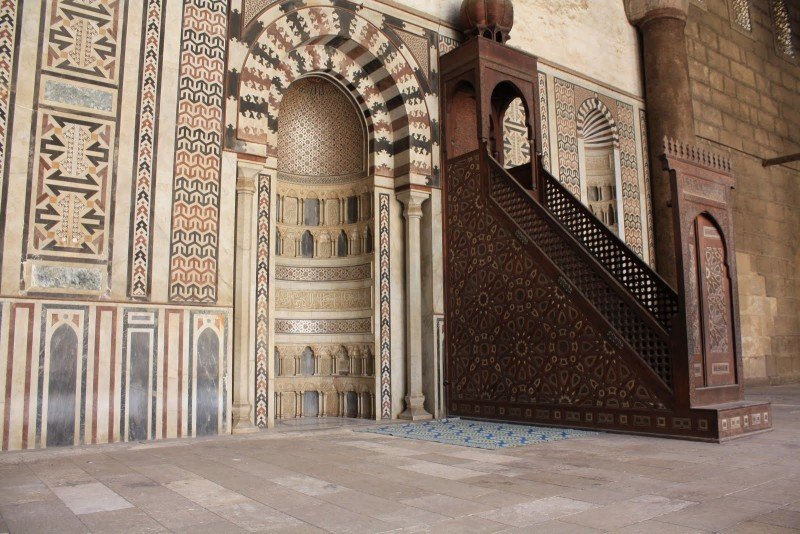
The building is generally roofed over, containing a Mihrab and a Minbar. There is essentially an open space for large gathering as well.

A common feature of mosques is a minaret, a tall thin tower that is usually located at one of the corners. From the minaret, a muezzin or Imam proclaims call to worship (Azan) five times each day.
The prayer hall of Masjid normally does not have any benches or chairs. Worshippers pray in rows facing Holy Kaaba which is the center towards which Muslims around the world face while offering prayer. There are no pictures on the walls. However verses of the Quran are inscribed or painted on the walls to assist worshippers. Every mosque has a Mihrab, a niche in the wall that points to the Holy Kaaba. From Minbar, the Imam delivers his speech.
Praying in the right way
Most of the Muslims prefer to offer prayer in congregation and avoid individual prayers. As Abu Hurairah (ra) narrated:
Prophet Mohammad (pbuh) entered the mosque and a person followed him. The man prayed and went to the Prophet and greeted him. The Prophet returned the greeting and said to him, ‘Go back and repeat your prayer, for you have not prayed.’ The man went back, prayed in the same way as before, returned and greeted Prophet Mohammad. He again said, ‘Go back and repeat your prayer, for you have not prayed.’ This happened thrice. The man said, ‘By Him Who sent you with the Truth, I cannot offer the prayer in a better way than this. Please teach me how to pray.’ Then Prophet Mohammad (pbuh) said, ‘When you stand for prayer say Takbeer and then recite from the Holy Quran (of what you know by heart) and then bow till you feel at ease. Raise your head and stand up straight. Then prostrate till you feel at ease during your prostration. Then sit with calmness till you feel at ease (do not hurry). Do the same in all your prayers’
We all should try to offer prayers in the best manner in congregation in mosques for getting greater rewards.
Importance of Mosque
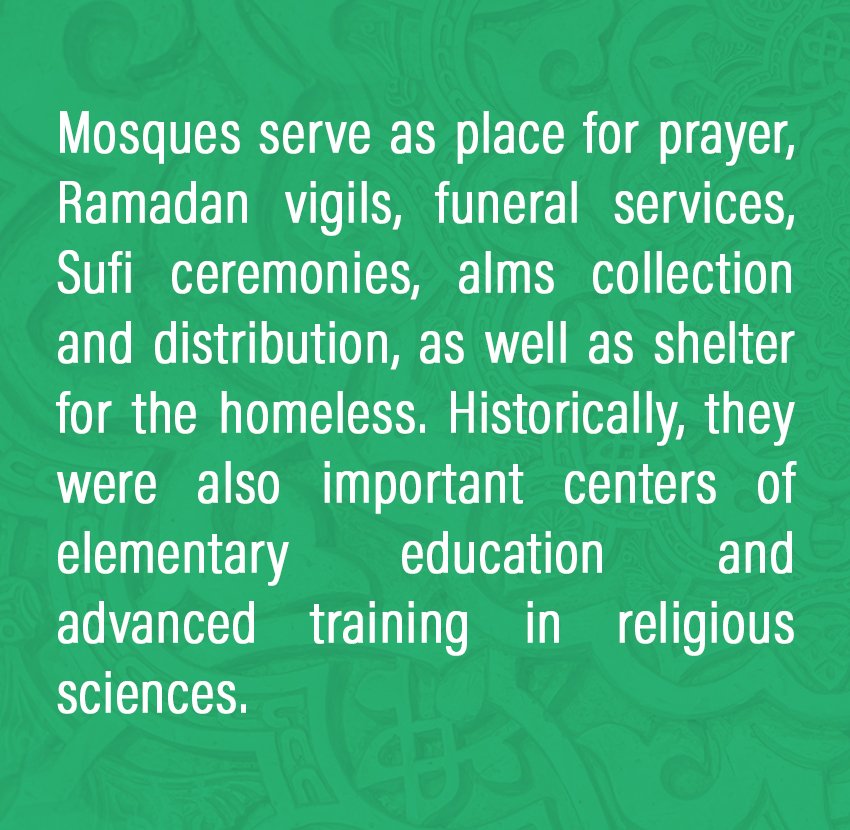
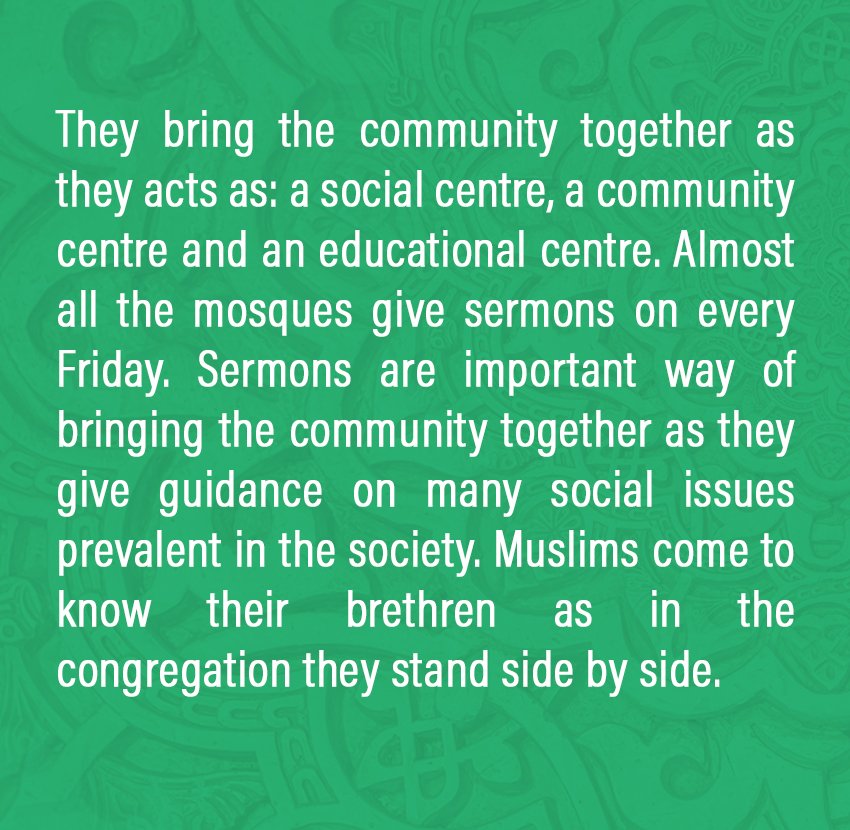
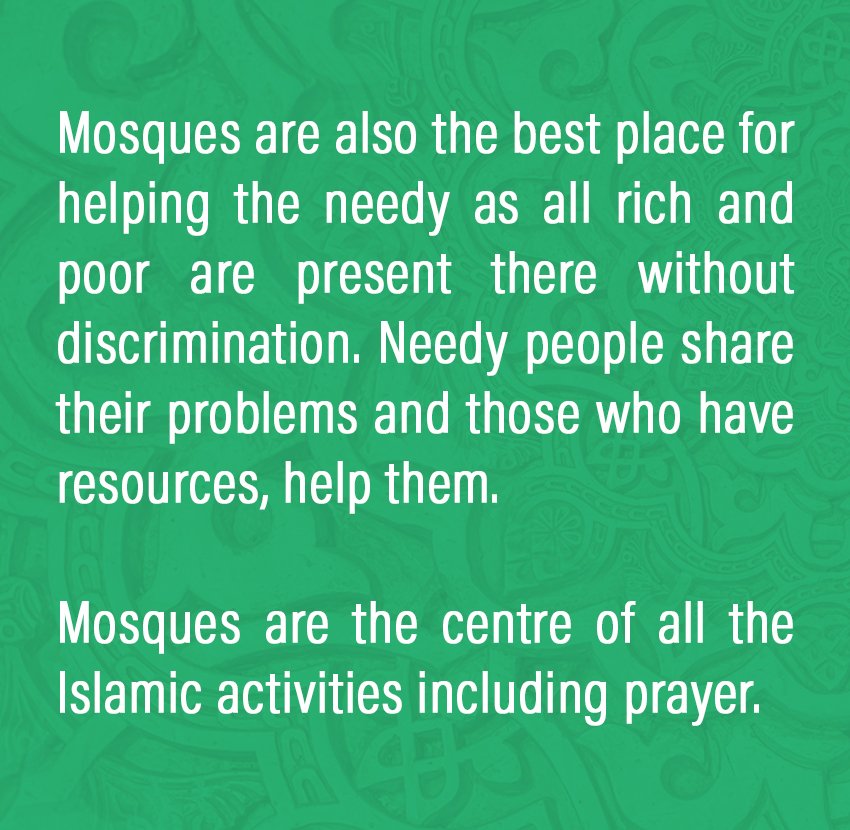
Why do we need mosques?
Collective communication with Allah
Muslims need mosques so that they can collectively communicate with Allah and gain His love. Allah says:
And that mosques are (specified) for Allah alone. So never worship anyone else besides Allah.
For spiritual purification
Muslims do need mosques for spiritual purification i.e. to purify their inwards from anything other than Allah and attain Divine love. Allah says:
(O Beloved!) Never stand in this (building which has been built in the name of a mosque). But the mosque which you have founded in the fear of Allah has more honour for you. There are people in it who love their purification (both physically and spiritually). As Allah loves those who commit themselves to purity. (9 : 108)
For proper guidance of Islamic values
Many Muslims congregate at mosques for prayer while others choose to pray at home, work or wherever they may be. But praying in the mosque is essential as Allah says in Quran:
And who is more unjust than he who forbids remembering Allah’s name in His mosques and strives to desolate them? It was not proper for them to enter the mosques but fearing (Allah). For them is disgrace in this world, and (also) there is a dreadful torment for them in the hereafter. (2 : 114)
While the primary use of a mosque is prayer, it also serves as a community center with people gathering to listen to lectures about Islamic values, attend study groups thus gain knowledge about Islamic values.
Muslims pray in mosques five times under the Imam appointed by the Mosque committee. Since the believers stand behind the Imam for offering prayers. They also listen to the sermons delivered by the Imam. Hence they could understand the true essence of the Arabic verses with their background.
For proper guidance in life
Mosques are a center of Islam that inculcate its true essence into the individuals with its sermons. Hence, provide the believers with proper guidance to pray with Divine love and follow Allah wholeheartedly. Along with that they make their lives more beautiful and organized as Islam itself is.
To worship
In Islam, worshiping Allah (to achieve His love) is the very purpose of mankind’s existence. Allah declares in the Quran:
“I did not create mankind except to worship Me” (51:56).
As Allah is the only One Who is the Sustainer, the Creator, and the Completely Unique Essence. Hence we should worship Him in His Love.
Islam enjoins believers to pray Him throughout the day at dawn, noon, mid-afternoon, sunset and night. In fact, Muslims can pray anytime (seeking Him in prayers) except at the exact sunrise and sunset times.
Mosques are especially active on Fridays for the congregational noon prayer because it is a blessed day and praying together on this day a person earns lots of rewards and blessings. Allah says in the Holy Quran:
O believers! When on Fridays the muezzin call you for Prayer, hasten towards the remembrance of Allah immediately and abandon purchase and sale. That is better for you if you have knowledge. (62 : 9)
Also during Ramadan, Allah increases the reward of praying in mosques thousand times more than the other days.
For Recitation of Holy Quran
The word ‘Quran’ literally means the book which should be recited frequently. The Holy Quran provides guidance regarding all areas of life. The recitation of Quran along with its translation form a comprehensive way to understand what He is saying to us while realizing His grandeur. The Muslims recite Quran during and after every prayer. Translations of Quran are available in almost every language of the world to help people understand it.

Two mosques made by Prophet Mohammad himself
Masjid e Quba (The first mosque of Muslim world)
The Quba Mosque in the outskirts of Madina is the first structure built by Prophet Mohammad (pbuh) upon his emigration from Makkah in 622 CE.
The Quba Mosque is where Prophet Mohammad accompanied by Abu Bakr Siddiq first stayed after emigrating from Makkah. They arrived there on Monday 12th Rab’i al-Awwal, fourteen years after declaration of Prophethood and this date marks the beginning of the Islamic calendar (Hijra), (16th July 622 CE).
The virtue of Masjid Quba is mentioned in the following Hadith:
Prophet Mohammad pbuh said: “He who purifies himself at his home and comes to Masjid Quba and offers two rakats therein, will be rewarded the reward of an Umrah (lesser pilgrimage).” [Sunan ibn Majah]
Masjid e Nabwi
Masjid Nabwi (Prophet’s Mosque) is the second holiest mosque or site in Islam and it is also one of the largest mosques in the world.
Background
This mosque was built by Prophet Muhammad in 1 AH after his arrival in Madina. Riding a camel called Qaswa, he arrived at the place where this mosque was built, which was being used as a burial ground. Refusing to accept the land as a gift from the two orphans, Sahl and Suhayl who owned the land, he bought the land which was paid for by Abu Ayyub al-Ansari and it took seven months to complete the construction of the mosque. The roof which was supported by palm trunks was made of beaten clay and palm leaves. The three doors of the mosque were the “Gate of Mercy” (Bab ar-Rahmah) to the south, “Gate of Gabriel” (Bab Jibril) to the west and “Gate of Women” (Bab un- Nisa) to the east.
Rewards of constructing a mosque
The rewards for constructing a mosque are countless and unending; for the constructor, the builder as well as those who help. For every act done to help in building a mosque, Allah will reward you in this world as well as in the hereafter.
The greatest reward for contributing in building a mosque is the closeness of Allah for the builder as well as the helpers.
Contributing for the construction of a mosque is Sadaqah-e-Jariyah (continued charity). Prophet Mohammad said, “When a man dies, his deeds come to an end except for three things: Sadaqah-e-Jariyah, knowledge which is beneficial or a virtuous descendant who prays for him” [Muslim]
Prophet Mohammad said about the reward for building a mosque, “Whoever builds a mosque, desiring thereby Allah’s pleasure, Allah builds for him the like of it in paradise.” [Bukhari]
Uniting communities
Prophet Muhammad (pbuh) said, “Whoever relieves the hardship of a believer in this world, Allah will relieve his hardship on the Day of Resurrection. Whoever helps ease one in difficulty, Allah will make it easy for him in this world and in the Hereafter.” [Muslim]
Communal prayer, spiritual guidance, Islamic education for children and a safe community hub are only a few of the benefits of building a mosque in Muslim communities. The one who contributes in building a mosque, hence letting others achieve all these goals, will gain Allah’s consent. Prophet Mohammad (pbuh) has told us the reward for building a mosque. Therefore we should follow his footsteps and contribute in building a mosque.